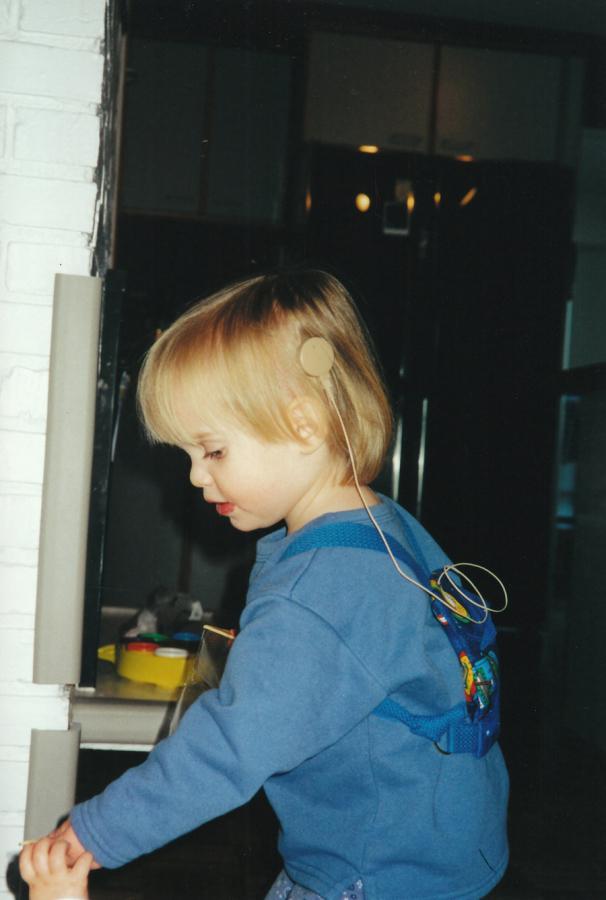Lorentz hears on a whole new level
Dec 15, 2014
Olivia Lorentz, sophomore, can always be found in the front of a classroom.
“Sometimes, if [my friends] are talking too fast or there’s background noise, it’s hard to have conversations with them,” Lorentz said.
When Lorentz was only seven months old, she suffered from bacterial meningitis, a potentially deadly disease that inflames the membranes surrounding the brain and spinal cord.
“We were told that one of the possible side effects of [bacterial meningitis] is permanent hearing loss, but of course we were just praying she would survive the illness,” said Eileen Lorentz, Olivia’s mother. “It wasn’t until her last night in the hospital that we noticed she wasn’t responding to our voices.”
From that point on, Olivia was deaf.
She wore hearing aids for the next 18 months until her parents realized they weren’t helping. At that point, the Lorentz’s decided to explore an alternative option for their daughter. The alternative option was a cochlear implant, a device that provides electrical stimulation to the auditory nerve in the ear, allowing most sounds to be heard by those who are deaf or severely hard-of-hearing. It’s composed of an external piece, which closely resembles a hearing aid, and an internal piece, which is surgically placed behind the ear.
“When something tragic like this happens to your child, you pray for a miracle cure. But sometimes the miracle is not a cure at all, but the gift of technology,” Eileen said. “We live in a hearing world, and if the technology is there, why not take advantage of it?”
Olivia received a cochlear implant in her left ear at the age of two. She is one of 38,000 children who have received a cochlear implant as of 2012, according to the Food and Drug Administration (FDA).
“We started thinking about the dangers associated with being deaf,” Eileen said. “Imagine you are in the path of a falling object and someone shouts, ‘Look out!’, but you can’t hear them; or the smoke alarm or carbon monoxide detector goes off in your home; or a tornado siren goes off in your neighborhood. If you can’t hear any of those things, you are at risk of being injured or killed.”
Fourteen years later, Olivia and her family still consider her cochlear implant a gift.
“Without a cochlear implant, I would probably have a difficult time speaking because I wouldn’t be able to hear my own voice,” Olivia said.
Since 2000, cochlear implants have been FDA-approved for eligible children who are deaf or severely hard-of-hearing beginning at 12 months old. Implanting the device at a young age improves a child’s ability to develop speech and language skills by exposing them to sounds during a prime period of development.
Although the cochlear implant helps Olivia hear better than before, she admits it isn’t a perfect alternative to hearing.
“I can’t hear every pitch,” Olivia said. “I can’t hear where the sound is coming from, whether it’s from behind me or in front of me or on the side.
When Olivia takes off the external part of her cochlear implant, which she has to do when she sleeps or showers, she can’t hear anything. In those instances, Olivia relies on her ability to read lips and sign.
“I read people’s lips a lot. I picked up on it really quickly when I was younger,” Olivia said. “It’s really important for me to see the person’s face [I’m talking to] and they can’t cover their lips.”
Although there are schools in Minn. that specialize in teaching deaf children, Olivia has attended Hopkins schools since preschool.
“There is a school for the deaf in Faribault, but we wanted her to be able to attend the local school that is part of our community. We wanted her to attend school with her brother and the kids in our neighborhood,” Eileen said.
As a public school, HHS isn’t necessarily catered to Lorentz’s needs, so she receives two important accommodations.
“The biggest accommodation is me, as an interpreter, because I go to every class with her, except lunch,” said Lisa Donley, Olivia’s interpreter. “The other is an FM system, where her teachers have a microphone that’s connected to Olivia’s [cochlear implant] to amplify their voices. It’s not for the whole class, but it makes it [easier] for her to hear them.”
This is Donley’s second year working with Olivia. Olivia’s parents are grateful to all the teachers and staff that have helped Olivia over the years and are proud of how she has overcome the obstacles she’s faced.
“She does not let her deafness define who she is,” Eileen said. “Yes, it is part of who she is, but it does not define who she is.”

